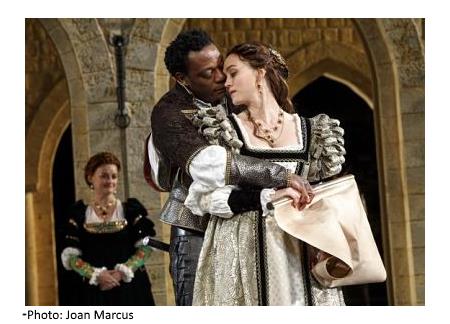

Posted 6/25/18

Any production of Othello, Shakespeare's tragedy of obsession, jealousy envy and manipulation, should incite anxiety and nervous disquiet. In the #metoo era, the story of Othello’s bitter betrayal of Desdemona, the woman he purports to adore, is profoundly disturbing.
Or in common parlance: Why should a fake bromance trump true love?
Alas, the attractive-yet-unfocused al fresco Othello now on view at the Delacorte Theater, with some notable exceptions, lacks dramatic urgency, undercutting the tragedy.
The engine of this play is driven entirely by the relationship between its two main characters: Othello, the titular general of Venice's army, and Iago, his constantly scheming lieutenant, who enlists us in a play-by-play as he plots the careful destruction of his commanding officer.
Like in Richard III, we are seduced by the playfulness of a malefactor who allows us to look over his shoulder as he frames an innocent victim or slices an expendable throat.
Unfortunately, director Reuben Santiago-Hudson decided to experiment by reversing the polarity of the two characters. Corey Stoll brings a folksy jocularity to Iago, establishing his relationship with the audience more like a standup comic than a charming psychopath.
But if there is no hell in Iago, there is no play.
The tragic forward movement of Othello is fueled by the alternating current of their respective forces of reason and passion: Iago plots and Othello reacts.
However, this Iago lacks an overarching intelligence capable of carrying out the series of maneuvers that will lure Othello into checkmate. Without such evil, Iago is reduced to a man annoyed because he was passed over for promotion. In his well-tailored black uniform by the elegantly restrained Toni-Leslie Jame, Stoll has the appearance and delivery of Louis C.K. in a West Village bar.
The misstep here is Chukwudi Iwuji as Othello. An actor of shimmering theatrical intelligence who brought emotional clarity to the Public’s The Low Road earlier this season, he is simply miscast.
His Othello begins so poised and lucid, that his descent into jealous madness can only be seen as an inexplicable psychotic break. When you start with an Othello of such acuity, you need an Iago of even greater resources to entrap him.
The supporting cast is generally sound. Though they both have notable moments later in the play, Motell Foster (Roderigo) and Babak Tafti (Cassio, who Othello promotes over Iago) spend their early scenes engaged in a lot of growling and barking as they cross swords together and with others.
The standout performances of the evening are Heather Lind, who makes a luminous and heartbreaking Desdemona, and Alison Wright, who brings a weary sense of abused grandeur to Iago’s wife, Emilia. The highlight of the evening is their scene together in Desdemona’s bedchamber, immaculately lit by Jane Cox.
Lind and Wright have the opportunity here to depict the complex relationship between two intelligent females who understand they are held captive by toxic masculinity.
The stately set by Rachel Hauck contributes to the overall attractiveness of the production.
The tragedy of Othello is twofold: He loves neither wisely nor too well. For a man expected to possess strategic sensibilities, he’s singularly flawed in the trust department.
The true sorrow is the sacrifice of Desdemona, who has defied all for her love of the Moor. For modern audiences, the machinations are nothing compared to Othello’s casual dismissal of Desdemona’s life. Unfortunately, the final scenes’ diffuse staging resembles aimless travelers standing around a defunct railway platform, waiting for a train called tragedy, which never left the station.
Love is also the rumination in Charles Mee’s quirky First Love at off-Broadway’s Cherry Lane. As the title suggests, real passion doesn’t always come in youth. Sometimes, it blossoms when least expected — by happenstance in our golden years.
Here, Harold (Michael O’Keefe) and Edith (an especially touching Angelina Fiordellisi) meet, in rather cantankerous fashion, on a park bench. To their unexpected delight, they share common interests. Political lefties, they click.
“You’re born, you die. In between, if you’re lucky, you have one great love. Not two, not three, just one,” Edith muses.
There is a whimsical aspect to Edward Pierce’s set design and Kim Weild’s direction, including a wordless young woman (Taylor Harvey) who seems to have popped out of a Magritte painting. Mee is known for his characters’ long monologues that muse on various suppositions. The technique can be interesting; it can also slip into a rant, which borders on irritating.
What’s lovely is watching these two frayed adults find each other. But they also, at times, careen into conventional male-female territory that proves depressing. The offbeat, 80-minute effort is funny and rueful, though Mees is an acquired taste. —Fern Siegel